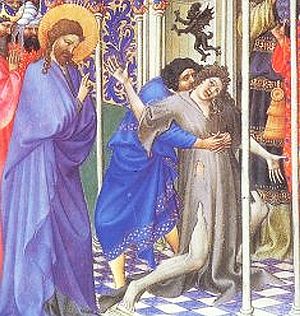
In English translations of the Bible, unclean spirit is a common rendering[1] of Greek pneuma akatharton (πνεῦμα ἀκάθαρτον; plural pneumata akatharta (πνεύματα ἀκάθαρτα)), which in its single occurrence in the Septuagint translates Hebrew ruaḥ tum'ah (רוּחַ טוּמְאָה).
The Greek term appears 21 times in the New Testament in the context of demonic possession.[2] It is also translated into English as spirit of impurity[3] or more loosely as "evil spirit." The Latin equivalent is spiritus immundus.[4]
The association of physical and spiritual cleanliness is, if not universal, widespread and continues into the 21st century: "To be virtuous is to be physically clean and free from the impurity that is sin," notes an article in Scientific American published 10 March 2009.[5] Some scholarship[6] seeks to differentiate between "unclean spirit" and "evil spirit" (pneuma ponêron) or "demon" (daimonion).[7]
- ^ For instance, in the King James Version, Wycliffe's Bible, Tyndale Bible, New Revised Standard Version, American Standard Version, International Standard Version, World English Bible, New English Translation; "foule sprete" in the Coverdale Bible.
- ^ The term appears 21 times counting both singular and plural. J. Reiling, "Unclean spirits," in Dictionary of Deities and Demons in the Bible, henceforth abbreviated DDD (William B. Eerdmans Publishing, 1999), p. 882 online.
- ^ As in the New International Version. See Karen Hartnup, On the Beliefs of the Greeks: Leo Allatios and Popular Orthodoxy (Brill, 2004), p. 88, especially note 16 online.
- ^ Pierre Maréchaux, "Les noces de Panurge et de Mercure: Rabelais et la leçon de Martianus Capella," in Études Rabelaisiennes 33 (1998), p. 167 online.
- ^ Gary Sherman and Gerald Clore, "Clean and Virtuous: When Physical Purity Becomes Moral Purity," Scientific American 10 March 2009, accessed online 20 April 2009; also WebCite archive.
- ^ Clinton Wahlen presents an overview of this scholarship in Jesus and the Impurity of Spirits in the Synoptic Gospels (Mohr Siebeck, 2004). For a table of terms used for evil powers in the New Testament, see p. 177 online.
- ^ DDD, p. 882. For daimon, not considered a synonym, see The concept of pneuma following.